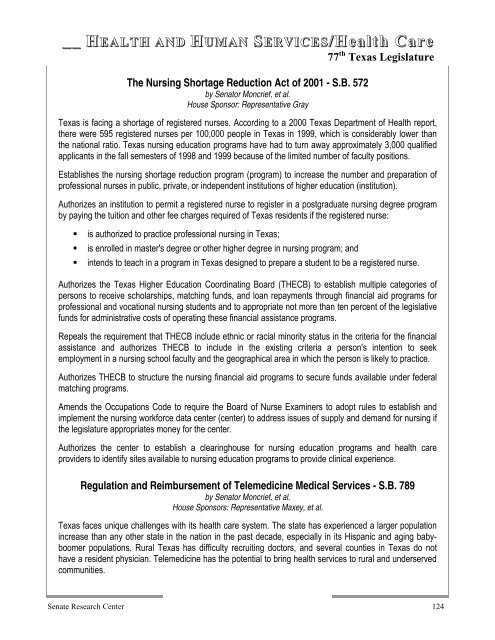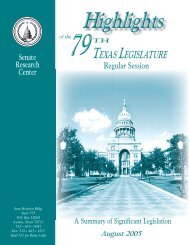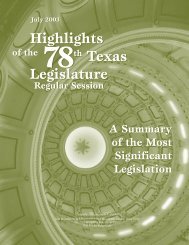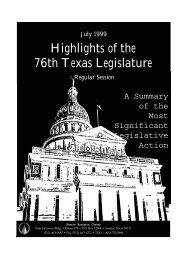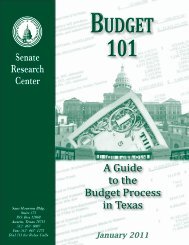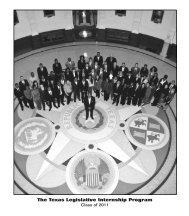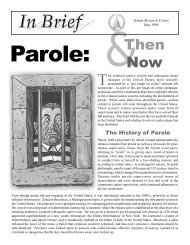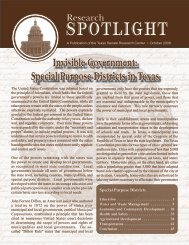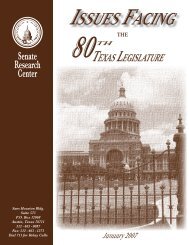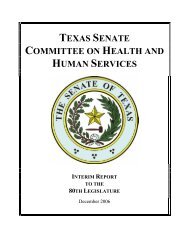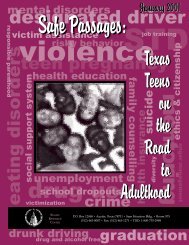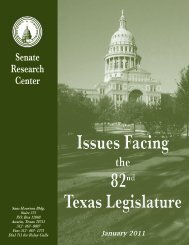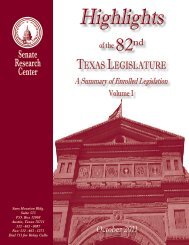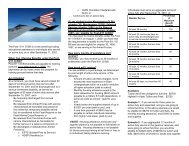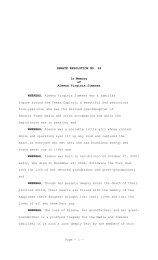- Page 1 and 2:
Highlights of the July 2001 77 th T
- Page 3 and 4:
Highlights of the July 2001 77 th T
- Page 5 and 6:
______________________T ABLE OF ABL
- Page 7 and 8:
______________________T ABLE OF ABL
- Page 9 and 10:
______________________T ABLE OF ABL
- Page 11 and 12:
______________________T ABLE OF ABL
- Page 13 and 14:
______________________T ABLE OF ABL
- Page 15 and 16:
______________________T ABLE OF ABL
- Page 17:
______________________T ABLE OF ABL
- Page 20 and 21:
_____________________ A PPROPRIATIO
- Page 22 and 23:
_____________________ A PPROPRIATIO
- Page 24 and 25:
_____________________ A PPROPRIATIO
- Page 26 and 27:
_____________________ A PPROPRIATIO
- Page 28 and 29:
_____________________ A PPROPRIATIO
- Page 30 and 31:
_____________________ A PPROPRIATIO
- Page 32 and 33:
_____________________ A PPROPRIATIO
- Page 34 and 35:
_____________________ A PPROPRIATIO
- Page 36 and 37:
_____________________ A PPROPRIATIO
- Page 38 and 39:
_____________________ A PPROPRIATIO
- Page 40 and 41:
_____________________ A PPROPRIATIO
- Page 42 and 43:
________________________ BORDER AFF
- Page 44 and 45:
________________________ BORDER AFF
- Page 46 and 47:
________________________________ BU
- Page 48 and 49:
________________________________ BU
- Page 50 and 51:
________________________________ BU
- Page 52 and 53:
________________________________ BU
- Page 54 and 55:
________________________________ BU
- Page 56 and 57:
_______ C RIMINAL RIMINAL JUSTICE U
- Page 58 and 59:
_______ C RIMINAL RIMINAL JUSTICE U
- Page 60 and 61:
________________ C RIMINAL USTICE/G
- Page 62 and 63:
________________ C RIMINAL USTICE/G
- Page 64 and 65:
________________ C RIMINAL USTICE/G
- Page 66 and 67:
________________ C RIMINAL USTICE/G
- Page 68 and 69:
________________ C RIMINAL USTICE/G
- Page 70 and 71:
________________ C RIMINAL USTICE/G
- Page 72 and 73:
________________ C RIMINAL USTICE/G
- Page 74 and 75:
________________ C RIMINAL USTICE/G
- Page 76 and 77:
______________ C RIMINAL USTICE /Ju
- Page 78 and 79:
______________ C RIMINAL USTICE /Ju
- Page 80 and 81:
______________ C RIMINAL Miscellane
- Page 82 and 83:
CRIMINAL JUSTICE Offenses USTICE/Se
- Page 84 and 85:
CRIMINAL JUSTICE Offenses USTICE/Se
- Page 86 and 87:
CRIMINAL JUSTICE Offenses USTICE/Se
- Page 88 and 89:
CRIMINAL JUSTICE Offenses USTICE/Se
- Page 90 and 91:
_________________ E CONOMIC CONOMIC
- Page 92 and 93: _________________ E CONOMIC CONOMIC
- Page 94 and 95: _________________ E CONOMIC CONOMIC
- Page 96 and 97: _________________ E CONOMIC CONOMIC
- Page 98 and 99: ______________________ EDUCATION/Hi
- Page 100 and 101: ______________________ EDUCATION/Hi
- Page 102 and 103: ______________________ EDUCATION/Hi
- Page 104 and 105: ______________________ EDUCATION/Hi
- Page 106 and 107: ______________________ EDUCATION/Hi
- Page 108 and 109: _______________________ E DUCATION/
- Page 110 and 111: _______________________ E DUCATION/
- Page 112 and 113: _______________________ E DUCATION/
- Page 114 and 115: _______________________ E DUCATION/
- Page 116 and 117: _______________________ E DUCATION/
- Page 118 and 119: _______________________ E DUCATION/
- Page 120 and 121: _______________________________ FIN
- Page 122 and 123: _______________________________ FIN
- Page 124 and 125: ___ HEALTH AND HUMAN /Child Care UM
- Page 126 and 127: ___ HEALTH AND HUMAN /Child Care UM
- Page 128 and 129: HEALTH AND HUMAN SERVICES/Child Cus
- Page 130 and 131: HEALTH AND HUMAN SERVICES/Child Cus
- Page 132 and 133: HEALTH AND HUMAN SERVICES/Child Sup
- Page 134 and 135: _____ HEALTH AND HUMAN ERVICES/Chil
- Page 136 and 137: _____ HEALTH AND HUMAN ERVICES/Chil
- Page 138 and 139: ______ HEALTH AND HUMAN ERVICES/Gen
- Page 140 and 141: __ HEALTH AND HUMAN ERVICES/Health
- Page 144 and 145: __ HEALTH AND HUMAN ERVICES/Health
- Page 146 and 147: __ HEALTH AND HUMAN ERVICES/Health
- Page 148 and 149: HEALTH AND HUMAN SERVICES Care ERVI
- Page 150 and 151: HEALTH AND HUMAN SERVICES Care ERVI
- Page 152 and 153: HEALTH AND HUMAN SERVICES Care ERVI
- Page 154 and 155: HEALTH AND HUMAN SERVICES Care ERVI
- Page 156 and 157: HEALTH AND HUMAN SERVICES Care ERVI
- Page 158 and 159: HEALTH AND HUMAN SERVICES CHIP ERVI
- Page 160 and 161: HEALTH AND HUMAN SERVICES CHIP ERVI
- Page 162 and 163: HEALTH AND HUMAN SERVICES CHIP ERVI
- Page 164 and 165: HEALTH AND HUMAN SERVICES CHIP ERVI
- Page 166 and 167: HEALTH AND HUMAN SERVICES CHIP ERVI
- Page 168 and 169: ___ HEALTH AND HUMAN ERVICES/Regula
- Page 170 and 171: ___ HEALTH AND HUMAN ERVICES/Regula
- Page 172 and 173: ___ HEALTH AND HUMAN ERVICES/Regula
- Page 174 and 175: ___ HEALTH AND HUMAN ERVICES/Regula
- Page 176 and 177: ___ HEALTH AND HUMAN ERVICES/Regula
- Page 178 and 179: ___ HEALTH AND HUMAN ERVICES/Regula
- Page 180 and 181: ___ HEALTH AND HUMAN ERVICES/Regula
- Page 182 and 183: _______________________________ HOU
- Page 184 and 185: _______________________________ HOU
- Page 186 and 187: _______________________________ HOU
- Page 188 and 189: _______________________________ HOU
- Page 190 and 191: _____________________________ INSUR
- Page 192 and 193:
_____________________________ Fire
- Page 194 and 195:
_____________________________ Insur
- Page 196 and 197:
_____________________________ Long-
- Page 198 and 199:
______________________________ JUDI
- Page 200 and 201:
______________________________ JUDI
- Page 202 and 203:
_________________________ JURISPRUD
- Page 204 and 205:
_________________________ JURISPRUD
- Page 206 and 207:
_________________________ JURISPRUD
- Page 208 and 209:
_________________________ JURISPRUD
- Page 210 and 211:
_________________________ JURISPRUD
- Page 212 and 213:
_________________________ JURISPRUD
- Page 214 and 215:
_________________________ JURISPRUD
- Page 216 and 217:
_________________________ JURISPRUD
- Page 218 and 219:
_____________________ L OCAL OCAL G
- Page 220 and 221:
_____________________ L OCAL OCAL G
- Page 222 and 223:
_____________________ L OCAL Legisl
- Page 224 and 225:
_____________________ L OCAL OCAL G
- Page 226 and 227:
_____________________ L OCAL OCAL G
- Page 228 and 229:
__________ N ATURAL ESOURCES/Agricu
- Page 230 and 231:
__________ N ATURAL ESOURCES/Agricu
- Page 232 and 233:
_________________ NATURAL RESOURCES
- Page 234 and 235:
_________________ NATURAL RESOURCES
- Page 236 and 237:
_________________ NATURAL RESOURCES
- Page 238 and 239:
_____________ NATURAL RESOURCES/Gen
- Page 240 and 241:
_____________ NATURAL RESOURCES/Gen
- Page 242 and 243:
_____________ NATURAL RESOURCES/Gen
- Page 244 and 245:
_____________ NATURAL RESOURCES/Gen
- Page 246 and 247:
_____________ NATURAL RESOURCES/Gen
- Page 248 and 249:
_______________ N ATURAL Surface Wa
- Page 250 and 251:
_______________ N ATURAL /Water ATU
- Page 252 and 253:
_______________ N ATURAL /Water ATU
- Page 254 and 255:
_______________ N ATURAL /Water ATU
- Page 256 and 257:
_______________ N ATURAL /Water ATU
- Page 258 and 259:
___________________________ REGULAT
- Page 260 and 261:
___________________________ REGULAT
- Page 262 and 263:
___________________________ REGULAT
- Page 264 and 265:
___________________________ REGULAT
- Page 266 and 267:
___________________________ REGULAT
- Page 268 and 269:
___________________________ REGULAT
- Page 270 and 271:
__________________ S TATE FFAIRS/Ag
- Page 272 and 273:
__________________ S TATE FFAIRS/Ag
- Page 274 and 275:
__________________ S TATE FFAIRS/Ag
- Page 276 and 277:
__________________ S TATE FFAIRS/Ag
- Page 278 and 279:
__________________ S TATE FFAIRS/Ag
- Page 280 and 281:
__________________ S TATE FFAIRS/Ag
- Page 282 and 283:
__________________ S TATE FFAIRS/Ag
- Page 284 and 285:
__________________ S TATE FFAIRS/Ag
- Page 286 and 287:
__________________ S TATE FFAIRS/Ag
- Page 288 and 289:
_________________ STATE AFFAIRS/Ele
- Page 290 and 291:
_________________ STATE AFFAIRS/Ele
- Page 292 and 293:
___________________S TATE FFAIRS/Ge
- Page 294 and 295:
___________________S TATE FFAIRS/Ge
- Page 296 and 297:
___________________S TATE FFAIRS/Ge
- Page 298 and 299:
___________________S TATE FFAIRS/Ge
- Page 300 and 301:
___________________S TATE FFAIRS/Ge
- Page 302 and 303:
STATE AFFAIRS Issues FFAIRS/Public
- Page 304 and 305:
STATE AFFAIRS Issues FFAIRS/Public
- Page 306 and 307:
STATE AFFAIRS Issues FFAIRS/Public
- Page 308 and 309:
STATE AFFAIRS Issues FFAIRS/Public
- Page 310 and 311:
STATE AFFAIRS Issues FFAIRS/Public
- Page 312 and 313:
___________________________________
- Page 314 and 315:
___________________________________
- Page 316 and 317:
___________________________________
- Page 318 and 319:
___________________________________
- Page 320 and 321:
________________________ TRANSPORTA
- Page 322 and 323:
________________________ TRANSPORTA
- Page 324 and 325:
________________________ TRANSPORTA
- Page 326 and 327:
________________________ TRANSPORTA
- Page 328 and 329:
________________________ TRANSPORTA
- Page 330 and 331:
______________________________ UTIL
- Page 332 and 333:
______________________________ UTIL
- Page 334 and 335:
___________ V ETERAN AND ETERAN AND
- Page 336 and 337:
___________ V ETERAN AND ETERAN AND
- Page 338 and 339:
_______________ WORKFORCE DEVELOPME
- Page 340 and 341:
_______________ WORKFORCE DEVELOPME
- Page 342 and 343:
_______________ WORKFORCE DEVELOPME
- Page 344 and 345:
_______________ WORKFORCE DEVELOPME
- Page 346 and 347:
__________________________________I
- Page 348 and 349:
__________________________________I
- Page 350 and 351:
__________________________________I
- Page 352 and 353:
__________________________________I


